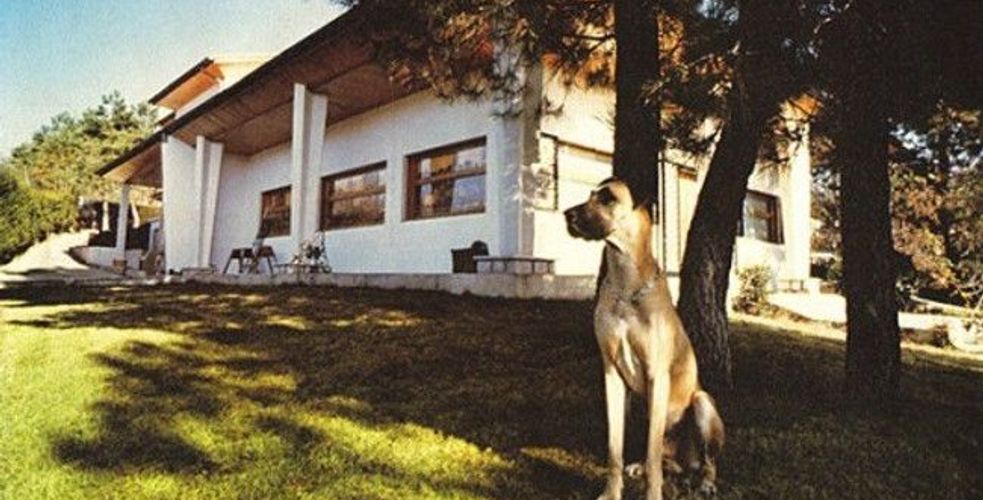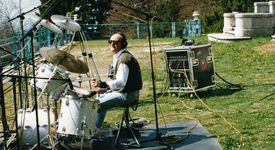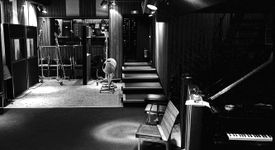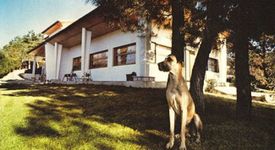COMFORTABLY NUMB. When David Gilmour and his band were in Berre-les-Alpes, at the Super Bear studio

An exclusive interview with sound engineer Patrick Jauneaud, one of the witnesses found by Manuel Jacquinet, author of the book Studios de légende, secrets et histoires de nos Abbey-Road français. Let's focus on what happens and ends, in November 1979, in a small village located 30 km above Nice: Berre-les-Alpes.

As Patrick Jauneaud tells us in the video (he was present at the time in the studio, as a sound engineer), "Damon Metrebian was a young, gifted and ambitious English musician who decided to create, in France, the studio of his dreams, the one in which he could welcome and record David Gilmour, Elton John, Kate Bush, etc. And within a few years, that's exactly what he did. The Pink Floyd guitarist recorded his first solo album there, and a few months later, the whole band arrived and recorded 80% of The Wall there, in France. The atmosphere is not the warmest between Waters, Nick Mason and the others, but it didn't matter. The last sessions for the double album were completed in Miraval, in the Var. In another magnificent studio, now owned by Angelina Jolie and Brad Pitt.
"When I discovered the existence of Super Bear, which has become a commonplace guest house, it was one of the things that made me want to write this book," says the author, Manuel Jacquinet. That was forty-one years ago, but there is no longer any trace of it, no more photos of the Miraval Studio, hardly any witnesses to that recording. The book is not a compendium of nostalgia, simply an attempt to record the testimonies, the clues, the photos, which, in a subtle mix, allow us to understand what really happened and why all these people were there, at that time. It is also an attempt to shed light, in addition to others (see below), on how works are or were made, collective works, a point that cannot be forgotten. And on the very prosaic questions or motivations that provoked these visits, recordings. If we dig a little, we discover that the desire to escape the British taxman, the Taxman, the desire to enjoy the charms of the Côte d'Azur or the Monaco racetrack combined to make all this happen. Pink Floyd had already worked in French residential studios, such as the Château d'Hérouville, during the making of Obscured by Clouds, for example, which was to be the soundtrack of the film The Valley (Barbet Schroeder). When I asked the director and Bulle Ogier, his wife, to write the book, the only thing they both said to me about their visit to Hérouville was "It was very pleasant. And I enjoyed working with Pink Floyd, who were not very well known at the time. Everything is said and nothing at the same time.
What the Pink Floyd band members said about it in Mark Blake's Comfortably Numb, The inside story of Pink Floyd, which has some notes on the band members' accounts of these sessions in France.
"The jam sessions at Gilmour's home studio led to further sessions at Britannia Row, which, for tax reasons, led to a recording trip to Super Bear, near Nice, in January 1978. (...)
One of the nice things about recording in France is that you don't have to give as much to the taxman. In 1976, the group had hired a firm of financial advisers, Norton Warburg, to oversee its financial affairs. Under the Labour government of Prime Minister James Callaghan, those in the same tax bracket as Pink Floyd could pay up to 83% tax. To save them from the taxman, Norton Warburg suggested that the band put a percentage of their gross income into various venture capital companies. Floyd's money was subsequently invested in pizza parlours, skateboard manufacturers, a security company, a money and chequebook company...
Due to the tax laws of the day, the only way for the band to avoid losing everything was to leave the UK by 6 April 1979 and guarantee that they would not return until the following 365 days. It was recommended that they earn as much money as possible while they were away, because as they were not resident it would not be taxable.
Less than a month after being advised, all four had packed up and left the UK. While they already had second homes abroad, this was only the beginning of what David Gilmour would describe as a twelve month 'rather nomadic existence'. With the next fiscal year fast approaching, the band decided to move quickly into the Super Bear studios near Nice, taking as much of their own Britannia Row gear with them as possible. So, to improve the decor at Super Bear, the band arranged to remove the red carpet and reveal the marble floor it covered. (...) Mason and Wright stayed on at the studio. Waters and Gilmour had rented houses nearby. Mason, finding his accommodation rather average, eventually moved into Waters' luxurious villa near the town of Vence. Bob Ezrin booked himself a room in the Negresco mansion in Nice.
The recording process in Super Bear rarely involved all four band members at the same time. Although this had the liberating effect of allowing each member sufficient time to record their parts, there was a danger of isolation and separate camps within the band. In Super Bear, Nick Mason, who had, to Waters' surprise, learned to read sheet music for drums, recorded most of his parts in the early sessions, leaving the editing to Bob Ezrin and James Guthrie. With the groundwork laid to inspire others, Mason found it an added benefit to be able to escape from future sessions to race his Ferrari at Le Mans (where he came second in his class). Guthrie's long working day consisted of a shift with Waters and Gilmour from 10am to 6pm, before returning to the studio late into the night with Richard Wright.
As always, each of the members and their collaborators had a different take on “the Rick Wright situation”. Halfway through the sessions, Columbia offered the band a better deal if they could deliver the album in time for Christmas. At the same time, other sessions were booked at Miraval, the studio of pianist and jazzman Jacques Loussier in Provence. As well as saving time, the studio location was useful to Waters, who, determined to sing as much as possible for the album, used it to record many of his vocal parts.
"Super Bear was quite high up in the mountains and it's pretty well known that it's quite difficult to sing there," Gilmour recalls. "And Roger had a lot of trouble singing in harmony. Bob Ezrin, meanwhile, was tasked with moving from one studio to the other, soothing Waters in one and Gilmour in the other. "
Manuel Jacquinet interviewed Patrick Jauneaud at the very beginning of the writing of the book. The images, which were originally intended to be used for simple note-taking, have been edited into a video but the sound volume is low. Thank you for your indulgence and to Patrick Jauneaud, in the southern Cévennes.

Legendary studios, secrets and stories of our French Abbey Road
Beautiful book enriched with exclusive photos. 352 pages. Weight : 1,3kg !
Published by Malpaso-Radio Caroline Média.
45 euros.






